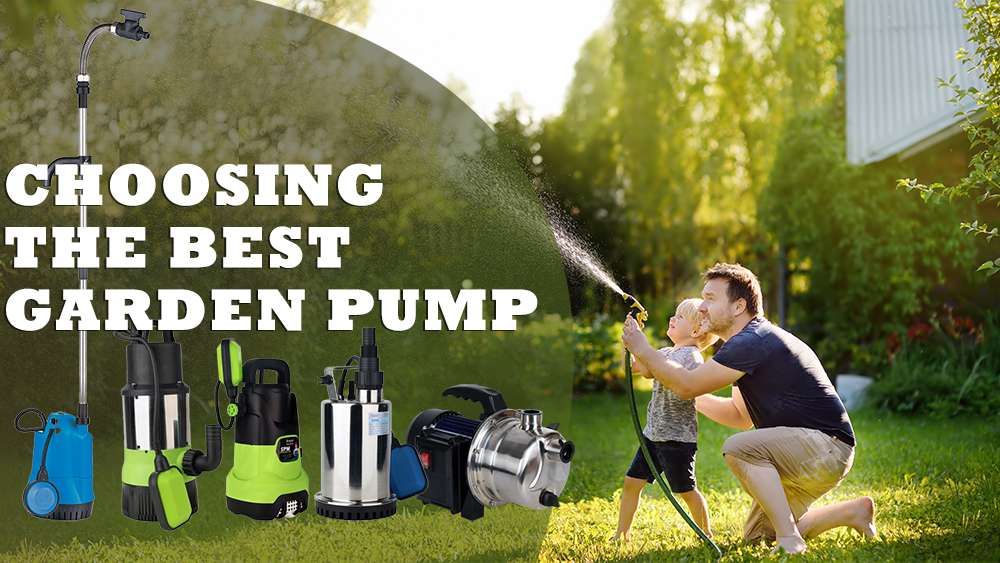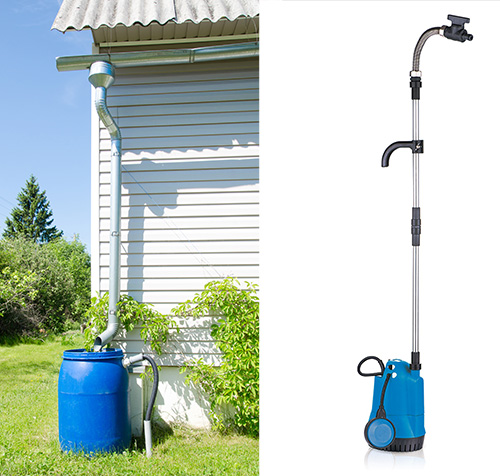+86 13816508465
Pump Solutions
Feb. 26, 2025

Water pumps are crucial in garden management, helping with tasks like irrigation, drainage, and cleaning. Whether you’re a casual gardener or a professional landscaper, selecting the right water pump can greatly improve your efficiency and make water management more economical. In this article, we’ll guide you through different types of water pumps and help you choose the one that best suits your garden’s needs.
Section 1: Types of Water Pumps for Garden Use

Submersible Pumps
Submersible pumps are designed to operate underwater, making them ideal for ponds, fountains, and garden irrigation systems.
How They Work: Submersible pumps are fully immersed in water and operate silently, drawing water into the pump via an intake and then pumping it out through an outlet.
Applications: They’re great for draining water from pools or ponds, irrigation, and handling water with debris.
Advantages:
Low noise levels, perfect for quiet environments.
Compact and easy to install, especially for small to medium-sized water bodies.
It can operate continuously under water without being affected by fluctuating water levels.

Surface Pumps
Surface pumps sit above the water and are typically used to draw water from wells, rivers, or reservoirs and pump it to the desired location.
How They Work: These pumps don’t submerge; instead, they use a suction pipe to pull water from the source and push it through an outlet pipe.
Applications: Ideal for large-scale irrigation, water supply for gardens, and water features.
Advantages:
Higher water flow rates are suitable for large-scale irrigation and garden watering systems.
Versatile enough to be used in various water sources, such as clean wells, ponds, or municipal water systems.
Easier to maintain and service since the motor and pump components are not submerged.

Water Butt Pumps
Water butt pumps are small, portable devices typically used for transferring small amounts of water. They are perfect for smaller garden tasks.
How They Work: These pumps can be powered by electricity or batteries and are used to move water from one area to another in a small quantity.
Applications: Ideal for small gardens, rainwater harvesting, or minor cleaning tasks.
Advantages:
Lightweight and easy to store or transport.
A low-cost option for homeowners with small gardens or limited space.
Quick to deploy for small-scale applications or emergencies.
Section 2: Key Features to Consider When Choosing a Garden Water Pump
Flow Rate and Head Height
Flow Rate: This refers to the volume of water the pump can move in a given time, typically measured in liters per hour (L/h) or liters per minute (L/min). When choosing a pump, consider the size of your garden and your water usage needs. A large garden or farm requires a pump with a higher flow rate, while smaller applications can be served by pumps with a lower flow rate.
Head Height: Head height indicates how high the pump can lift water. For higher-elevation gardens or large properties, a pump with a higher head height is necessary. The right head height ensures the pump can move water to the required destination without losing efficiency.
Materials and Durability
Since water pumps are exposed to moisture and outdoor conditions,selecting durable, corrosion-resistant materials is key for long-term performance.
Stainless Steel: Highly durable and resistant to corrosion,making it ideal for harsh environments like ponds, wells, and saltwater applications.
Plastic and Aluminum: These materials are lightweight and corrosion-resistant,making them suitable for smaller, more portable pumps.
Energy Efficiency and Noise Levels
Choosing an energy-efficient pump can significantly reduce electricity costs, especially for pumps used frequently.
Energy Efficiency: Look for pumps with energy-saving features, such as frequency conversion or multi-stage designs, which optimize power use.
Noise Levels: Quiet pumps are essential, particularly in residential areas.Submersible pumps tend to be quieter compared to surface pumps, which are more exposed.
Section 3: Applications of Water Pumps in the Garden
Irrigation
Water pumps are crucial for efficient irrigation, especially in larger gardens, farms, or areas with limited access to a water supply.
Recommended Pumps: For medium to large gardens, surface pumps are best as they can provide high flow rates and long-distance water transport. Submersible pumps can be used in smaller gardens or where water comes from a well or pond.
Cleaning
Water pumps help clean garden features like ponds, fountains, and water tanks, keeping your garden aesthetically pleasing and preventing water stagnation.
Recommended Pumps: Submersible pumps are ideal for handling debris-laden water in ponds or fountains.These pumps can handle dirt,leaves, and other debris,ensuring the water stays clean.
Flood Management and Drainage
During heavy rainfall, gardens can face waterlogging and flooding. A good water pump will help manage excess water and prevent plant root damage.
Recommended Pumps: Submersible pumps are particularly suited for drainage tasks, as they can quickly remove water from flooded areas without damaging plants.
Section 4: How to Select the Right Pump for Your Garden
Assess Your Garden's Needs
The first step in selecting a pump is to evaluate your garden’s specific needs:
Water Source: Is your water coming from a well, a pond, a river, or municipal water?
Water Requirements: Consider the amount of water you need for irrigation, cleaning, or drainage, and choose a pump with an appropriate flow rate and head height.
Choosing Between Submersible, Surface, or Water Butt Pumps
Submersible Pumps: Best for small to medium-sized ponds or water features, or for irrigation when the water source is low in elevation.
Surface Pumps: Ideal for larger gardens requiring extensive irrigation or when you need to pump water over a long distance.
Water Butt Pumps: Perfect for small-scale applications, including household or emergency use.
Cost vs. Benefit Analysis
It's important to balance your budget with the pump’s features. Consider the upfront cost, ongoing maintenance expenses, and the pump's energy consumption over time. Sometimes, investing in a higher-quality pump can save you money in the long run due to its durability and efficiency.
Conclusion
Choosing the right water pump for your garden is essential for managing water effectively. By evaluating your garden's size, water source, and the tasks you need the pump to perform, you can make an informed decision. Whether you choose a submersible, surface, or water butt pump, selecting the right model ensures a smoother, more efficient gardening experience.
Address
No.17 XeDa Jimei Ind. Park, Xiqing Economic Development Area, Tianjin, China
Telephone
+86 13816508465
QUICK LINKS